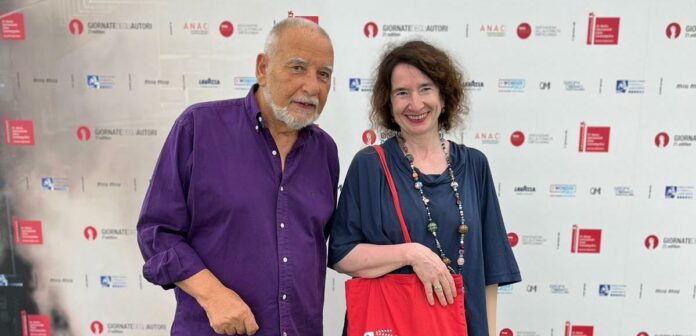“There are no hierarchies between human beings, and when we create them they give rise to apartheid situations, as happened in South Africa or as is happening in Israel with Palestinian Arabs.” So says writer Tahar Ben Jelloun (author of Racism Explained to My Daughter) at the pre-opening of Giornate Veneziane, where he chairs the jury of Bookciak, Azione! (formed with him by Gianluca Arcopinto, Wilma Labate and Teresa Marchesi).
For the competition conceived and directed by Gabriella Gallozzi (with the membership of the Film Journalists – SNGCI), this year on the theme of Everyday Peace, the winners were the shorts (taken from the books selected by the Bookciak Legge prize) Voci di libertà by Lavinia Andreani (taken from Clelia Pellicano’s collection of writings Nuovo e vecchio mondo), Mezzanotte by Andrea Alfieri and Patrizia Ricchiuti (from Federico Italiano’s collection of poems La grande nevicata), Akim’s Tea. A story of friendship by Flavio Ceccarani and Giorgio Battistelli (from the BeneDì graphic novel Il racconto della roccia) Ho sognato che a Milano c’era il mare by Mattia de Gennaro (for the Memory Ciak section in collaboration with Spi-CGIL, LiberEtà, Premio Zavattini and AAMOD, from Peppe Lomonaco’s novel Il ragazzo con la tuta blu) and Pace a colori (made by female prisoners at Rebibbia Prison), while Metamorfosi by Paolo Pisanelli and Matteo Gherardini was awarded the Bookciak Special Prize, Action!.
In contrast, the short film Empty Places by Viola Folodar (an alumna of the Michelangelo Antonioni Film Institute in Busto Arsizio) is inspired by Ben Jelloun’s latest book, The Scream. Israel and Palestine. The Need for Dialogue in the Time of War, as part of Bookciak’s collaboration with the publisher La Nave di Teseo. The text was not released in France because there, the author explains, “if you criticize Israel you are accused of anti-Semitism, and the word ‘Palestinian’ is practically forbidden, except to talk about Hamas terrorism.”
He, moreover, condemned the Oct. 7 attacks, but does not hesitate to call the Israeli military offensive in Gaza “genocide.” “Man has always loved war, and in the liberal capitalist system in which we live we produce weapons and therefore we have to sell them. The ones the Israelis are killing Palestinians with are coming from the United States.” In this scenario of “scattered” world warfare,” which also affects other countries from Sudan to Ukraine, the role of culture (including cinema) is essential: ”It cannot solve issues alone, but it is important that it participate in them.”
Emanuele Bucci
Preserving, restoring and promoting the classics of our cinema
“The Gold of Naples” Martin Scorsese recalled, ”was televised in New York in those days, and everyone in the neighborhood watched it every time and loved it very much. […] It’s a film that offers a wonderful range of comic styles and incorporates something I really appreciate in Italian cinema: the way it moves effortlessly between comedy and tragedy.” Presenting the film last night, before the world premiere screening of its 4K restored version by Filmauro and Cinecittà under the artistic supervision of Andrea De Sica, were producer Aurelio De Laurentiis of Filmauro, Chiara Sbarigia president of Cinecittà and, indeed, director Andrea De Sica, who is the great Vittorio’s grandson.
The Gold of Naples, based on the collection of short stories of the same name by Giuseppe Marotta, in the film reduction by Cesare Zavattini who scripted it with the writer and De Sica himself, was produced by Carlo Ponti and Dino De Laurentiis. The film is divided into 6 episodes: Il guappo, Pizze a credito, Il funeralino (“Episode that at the time Dino De Laurentiis had cut and that my father Manuel and Aurelio recovered,” recalls Andrea De Sica), I giocatori, Teresa and Il professore, with a cast in a state of grace: Totò (“Who for the first time did not improvise, but followed the script”), Sophia Loren, Silvana Mangano, Paolo Stoppa, Eduardo De Filippo, Tina Pica, and Vittorio De Sica himself.
“Here, in the ability to alternate dramaturgical tones in the same sequence, from comedy to drama, from farcical to intimist to social chronicle, the Italian comedy was born,” stresses De Laurentiis, who launches a proposal involving the Ministry of Culture and the Ministry of Education: ”Films like these should be allowed to return to theaters, perhaps in this case with a nice premiere at the San Carlo in Naples. Films need to be preserved and restored, but that’s not enough, then they need to be shown in theaters and also in schools.”
“To form a true film culture in our country it would be useful if already in the sixth grade two hours a week were dedicated to watching a classic of our cinema: so in one school year the new generations could know 40 of them.” For Andrea De Sica this restoration is also a symbolic picking up of the baton of restorations that his father Manuel was doing, who had stopped precisely at The Gold of Naples: “By showing this film to my daughter Maria, Vittorio’s great-granddaughter, I am keeping alive the generational memory about De Sica’s work. Our next restoration will be on The Last Judgment.”
Oscar Cosulich

